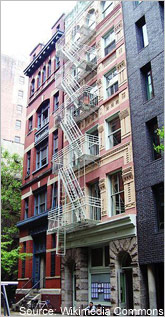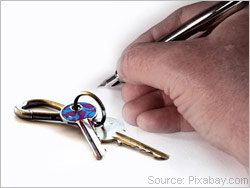 Finding your dream apartment is a daunting task--there is so much to consider (such as price, neighborhood, and amenities) and such a huge commitment to be made. Choosing an apartment is not a decision to be taken lightly, and requires thorough research, consideration, and time to pick the perfect place.
Finding your dream apartment is a daunting task--there is so much to consider (such as price, neighborhood, and amenities) and such a huge commitment to be made. Choosing an apartment is not a decision to be taken lightly, and requires thorough research, consideration, and time to pick the perfect place.
If you will be on the prowl for a new apartment in the near future, read on for the five most important apartment hunting tips to aid you in your search.
Calculate your price range.
Before you even begin searching, it's imperative to figure out your budget and what you can afford to spend on rent each month. This will prevent you from wasting time (and potentially money) viewing apartments out of your price range and paying the fees to submit rental applications.
Carefully add up all of your monthly costs and bills to determine how much you spend (such as car payment, car insurance, cell phone bill, groceries, entertainment, gym membership, cable, health insurance) as well as how much you would like to put in your savings account each month. Subtract the total from your monthly income to calculate how much you can put towards rent, and don't forget to factor in utilities if they're not included.
Make a list of essential amenities.
There are likely to be certain features you require in an apartment. Every unit has different conveniences, luxuries, and amenities, each with differing importance to you. Make a list of everything you are looking for in a place to narrow down your search and make it easier for you when checking listings.
Some common amenities and features to consider are:
- On-site laundry facilities (or a washer/dryer in your unit)
- Pets welcome
- Available parking
- Closet space
- Elevator
- Secure entrance/doorman
- Pool/gym
- Balcony/outdoor space
- On-site maintenance
You may not find a place that features every item on your wish list, but having an itemized account of everything your dream place would have will make it easier to determine which potential apartment would be your best fit.
Research the neighborhood.
Location, location, location. The quality of the area your apartment is located is just as important as the condition of the unit itself. Before you begin apartment hunting in any town or city, conduct thorough research on the region.
Some important factors to consider are:
- The crime rates
- Proximity to school, work or public transit
- Nightlife and entertainment options
- Family-friendliness
- Quality of schools
What's important in a neighborhood will vary from one person to the next--consider your preferences and find out if the area measures up. Are you single and seeking a lively nightclub scene? Are you a parent and prefer a quiet, family-friendly neighborhood with access to good schools and parks? Will you be relocating sans vehicle and require nearby public transit terminals? It's important to figure out what neighborhoods are optimum for your lifestyle so that you can begin searching for your perfect apartment in those areas.
Do your homework and ask questions.
Renting an apartment is a huge commitment--it's important to know everything you can about a place that will be your home for however long your lease requires. Not only do you want to ensure that the unit you are renting is functioning and in good condition, but that the person showing it to you is a legitimate landlord and not a scam artist attempting to swindle you out of your money. Make sure you do your homework so you can be aware of how to avoid rental scams, as well as ask the appropriate questions to avoid renting an apartment that is not as it seems.
Some essential questions to ask include:
- How long has the apartment been on the market? If the apartment has been vacant a long time, that could be a sign that there are problems with the unit or the building.
- Do all of the appliances work? Be sure to check their functioning levels yourself, and if the landlord promises any repairs will be made before you move in, get it put into your lease.
- Are utilities included? Confirm what, if any, utility costs will be included in your rent and make sure it is included in your lease.
- How old is the building? Have there been recent renovations? Knowing the age of the building and how up-to-date the wiring, plumbing, and other inner-workings are will give you a good idea of you can expect to deal with should you move in.
- Are there any late fees? What day is the rent due each month? If you should miss a scheduled rent payment, you will want to know what kind of fees you should expect to pay. This should also be included in your lease.
- How much is the security deposit and what are the grounds for getting it back? This is an imperative question and should be clearly illustrated in your lease should you decide to rent the unit.
- Do you have ID? In order to protect yourself from falling victim to a rental scam, ask the landlord for identification and verify their name as the owner on the property's public record. If a property manager or anyone else other than the owner is showing you the apartment, call the property owner as listed on the record and confirm that this person actually has the authority to show and rent the apartment to you.
Understand the lease before you sign.
 Your lease is a binding legal document, and it is imperative to understand everything illustrated in it before you sign on the dotted line. If it is unclear or there is anything you do not understand, be assertive and ask. Don't let a landlord respond vaguely or attempt to rush you through the process--this can be a red flag to walk away. Items that should be clearly stated in your lease include:
Your lease is a binding legal document, and it is imperative to understand everything illustrated in it before you sign on the dotted line. If it is unclear or there is anything you do not understand, be assertive and ask. Don't let a landlord respond vaguely or attempt to rush you through the process--this can be a red flag to walk away. Items that should be clearly stated in your lease include:
- The length of the lease (month-to-month, fixed term, etc).
- Amount of security deposit and grounds for its return
- Date of rent payment each month and late fee policy
- Included utilities
- Repairs and maintenance policy
- Pet policy
- Decoration policy
- Noise policy
- Required notice for vacating
- Grounds for legally breaking the lease
If you are renting an apartment for the first time, it is wise to bring an experienced renter with you to look over the lease and make sure everything appears to be on the up-and-up.